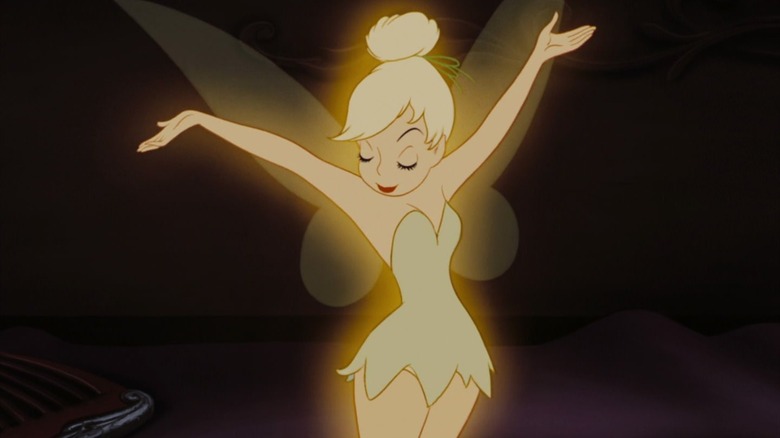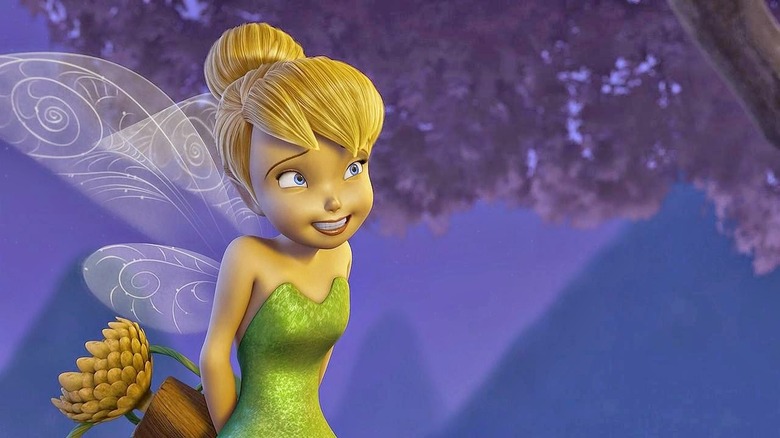The Correct Order To Watch Disney's Tinker Bell Movies
In J.M. Barrie's original 1904 play "Peter and Wendy," the fairy Tinker Bell was typically represented by a powerful spotlamp, reflected onto the stage by a small hand mirror. Her dialogue was a series of small jingle bells, shaken offstage. When Barrie adapted his play into a 1911 novel, Tinker Bell remained mute, although she was able to participate in the action more closely. In the first film adaptation of Barrie's work, Herbert Brenson's 1924 film "Peter Pan," Tinker Bell was a light dangled by a string in long shots but actor Virginia Browne Faire in close-ups, either filmed against outside sets or composited into the frame.
In 1953, directors Hamilton Luske, Clyde Geronimi, and Wilfred Jackson brought Pan to life in the celebrated animated film "Peter Pan," released by the Walt Disney Company. In that film, Tinker Bell was also mute, but could be animated as a miniature person in most of her scenes, modeled after Marilyn Monroe. This version of Tinker Bell, like in Barrie's play, was a grumpy, jealous character, resentful of Wendy's advances toward Peter. Luske, Gerinimi, and Jackson's "Peter Pan" became one of the films in the so-called Disney Canon and saw frequent theatrical re-releases, keeping the film in the consciousness for decades. Like many of Disney's film, it was turned into a product, producing picture books, Disneyland rides, and multiple spinoffs. Tinker Bell also became something of a mascot of the company, and her glittering arc-like fairy trail still accompanies the studio's vanity card at the start of every of its films.
As thanks, Disney has given Tinker Bell her own series of movies. In 2008, Tinker Bell began headlining her own "Peter Pan" prequels and sequels, introducing audiences to a vast fairy continuity from within Neverland. Tinker Bell also finally had a voice; she was played by actor Mae Whitman. To date, there have been six straight-to-video Tinker Bell movies, one short, and one TV special. They are as follows.
There are six Tinker Bell movies
The Tinker Bell films are best viewed in the order of their release. In other words:
- "Tinker Bell" (2008)
- "Tinker Bell and the Lost Treasure" (2009)
- "Tinker Bell and the Great Fairy Rescue" (2010)
- "Pixie Hollow Games" (2011) (TV Special)
- "Secret of the Wings" (2012)
- "Pixie Hollow Bake-Off" (2013) (Short)
- "The Pirate Fairy" (2014)
- "Tinker Bell and the Legend of the NeverBeast" (2015)
Those familiar with Peter Pan know Tinker Bell's backstory. The first laugh of an infant magically splits into many pieces, with the pieces becoming fairies. Fairies can die by the normal means — Tinker Bell famously drank a glass of poison to save Peter — but one can kill a random fairy merely by saying they don't believe in fairies. A fairy can, however, be resurrected with a staunch reaffirmation of faith and a round of applause.
The 2008 "Tinker Bell" was actually a panicked last-minute reworking of a proposed 2007 animated film to be called "Tinker Bell and the Ring of Belief." An animatic of that film can be found online, and there were even previews for the film on Disney DVDs at the time. The studio, however, found that film to be unwatchable, and "Ring of Belief" had to be re-written in a hurry.
The extant films see Tinker Bell interacting with fairy friends and going on lightweight and predictable adventures. The Tinker Bell films are light and distracting, but visually toyetic and commercially bland.
There have been several scrapped Tinker Bell solo movies, including "Tinker Academy," which would follow the fairy to the big city to meet urban tinkers (fairies are all amateur engineers). That film was abandoned, as was "Tink Meets Peter," a direct prequel to the 1953 "Peter Pan" film. The live-action Tinker Bell film "Tink" may still be in the works.
Despite their low profile and relatively tiny budgets (it cost $35 million, collectively, to make the first four movies), the straight-to-video "Tinker Bell" movies have raked in an impressive $493 million to date. The films have starred Kristin Chenoweth, America Ferrera, Lucy Liu, Raven-Symoné, and pop star Jesse McCartney.
Yes, this franchise is significant.

